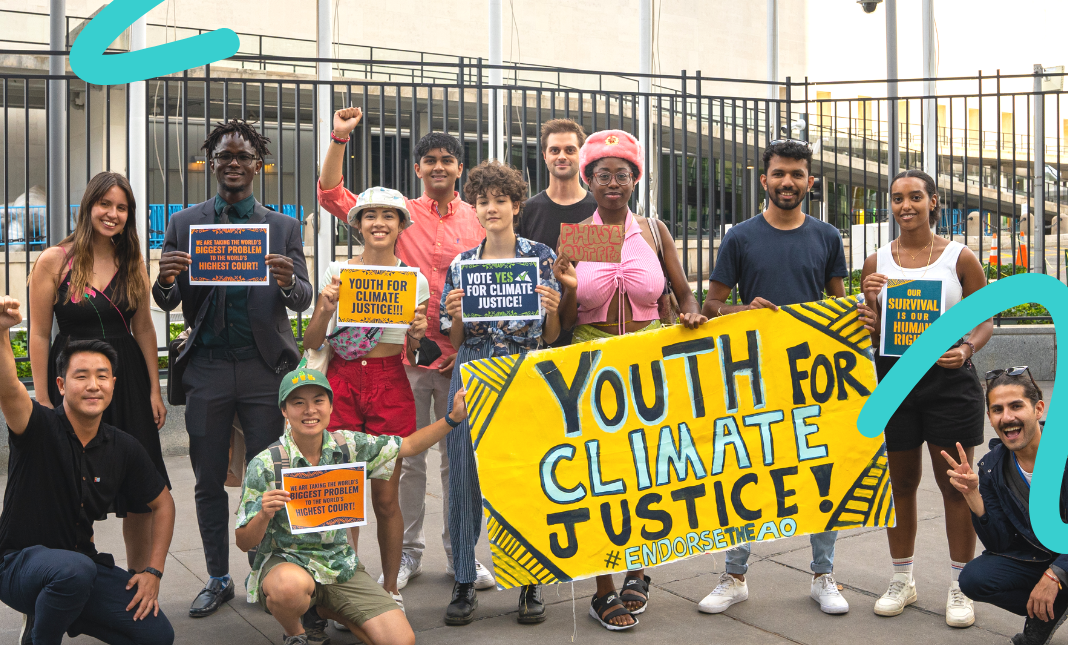Youth-led initiative focuses on protecting human rights of current and future generations
The UN General Assembly adopted a landmark resolution yesterday (March 29) requesting the International Court of Justice to render an Advisory Opinion on the obligations of States in respect of climate change.
The resolution was initiated by Pacific Island Students Fighting Climate Change, promoted globally by World’s Youth for Climate Justice, and introduced into the UNGA by Vanuatu. It has been inspired by the impact of previous ICJ cases, in particular the very influential 1996 ICJ Advisory Opinion on the Legality of the Threat or Use of Nuclear Weapons.
Why go to the ICJ?
- Governments are failing in their efforts to reduce carbon emissions sufficiently to prevent catastrophic climatic consequences.
- Vested interests in the fossil fuel economies have too much power nationally and in the international climate negotiations.
- Developing countries and poorer communities are disproportionately impacted by a crisis caused predominantly by the developed, richer countries.
- The few governments that are taking action to achieve net zero are at a competitive disadvantage to those governments not taking such action.
The ICJ can affirm legal obligations that apply universally, and it can level the playing field to ensure equitable transition to a global, fossil-fuel-free economy.
The Questions being asked of the Court:
The UN General Assembly asks the Court to render an advisory opinion on the following question:
“Having particular regard to the Charter of the United Nations, the International Covenants on Civil and Political Rights and on Economic, Social and Cultural Rights, the United Nations Framework Convention on Climate Change, the Paris Agreement, the United Nations Convention on the Law of the Sea, the duty of due diligence, the rights recognized in the Universal Declaration of Human Rights, the principle of prevention of significant harm to the environment, and the duty to protect and preserve the marine environment,
(1) What are the obligations of States under international law to ensure the protection of the climate system and other parts of the environment from anthropogenic emissions of greenhouse gases for States and for present and future generations;
(2) What are the legal consequences under these obligations for States where they, by their acts and omissions, have caused significant harm to the climate system and other parts of the environment, with respect to:
(a) States, including, in particular, small island developing States, which due to their geographical circumstances and level of development, are injured or specially affected by or are particularly vulnerable to the adverse effects of climate change?
(b) Peoples and individuals of the present and future generations affected by the adverse effects of climate change?”
Request to ICJ is unanimous
In 2021, Vanuatu announced its intention to seek an ICJ advisory opinion. Vanuatu established a core group of 18 countries to join its bid, including Angola, Antigua and Barbuda, Bangladesh, Costa Rica, Germany, Liechtenstein, Federated States of Micronesia, Morocco, Mozambique, New Zealand, Portugal, Romania, Samoa, Sierra Leone, Singapore, Uganda, and Vietnam.
By the time of UNGA action yesterday (March 29), the cross-regional core group secured more than 130 states as cosponsors of the resolution. The resolution was then adopted by consensus.
Important roles of youth and impacted communities
The campaign to get the UNGA to take this action was initiated by youth and has been led primarily by youth. The resolution highlights the rights under international law of present and future generations. Youth voices in the ICJ proceedings will therefore be very important.
In addition, the resolution highlights the impacts of climate change on vulnerable communities. The voices of these communities in the Court’s proceedings will also be very important.
Civil society representatives do not have direct standing in the Court. However UN Member States will be invited by the Court to make written and oral submissions on the issue.
Member states will be encouraged to include testimonies from youth and impacted communities in their submissions.
Quote from one of the Youth Leaders of the campaign
 Solomon Yeo and other campaigners outside the UN General Assembly in New York “Today we celebrate four years of arduous work by the Pacific Islands Students Fighting Climate Change members in convincing our leaders and raising global awareness on the initiative. We commend the undying support of our Pacific civil society organizations, communities and youth, who, without their support, we would not have ventured this far. Also, the adopted Resolution is a testament that Pacific youth are not insignificant but can play an instrumental role in advancing global climate action. Precisely why it is in our best interests that the youth voices should remain integral in the entire process. Now the first stage is over, we look to join hand in hand with our governments and relevant stakeholders in bringing the world’s biggest problem to the world’s highest court.” Solomon Yeo, Pacific Islands Students Fighting Climate Change and World’s Youth for Climate Justice |

